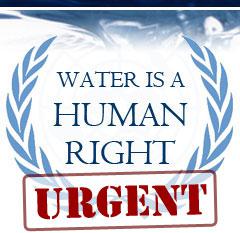
Water is essential to survival and health of all human beings. The right to water is a fundamental human right and a prerequisite for the realization of other human rights.
Water access: essential right for all children
The right to water is an essential right since water plays a major role in daily life and in the environment of all people, adults and children. The right to water implies the right to drinking water and to adequate sanitation.
An indispensable resource for life and survival
Water is an indispensable resource in the daily life of all human beings.
Water is particularly used for direct consumption, cooking and farmland irrigation.
There are 4 important principles to guarantee survival and health of everyone:
• Water must be available : this means enough quantity for all uses, personal and domestic. The United Nations has estimated that every person needs from 20 to 50 liters of drinking water each day.
• Water must be accessible : water, adequate facilities and services must be accessible in the home or nearby. The water, facilities and services must be affordable for all.
• Water must be of quality : water must be clean, potable and free of health risks.
• Water must be stable and reliable : clean water must be available and accessible in all circumstances (drought, flood that pollutes water, etc.).
An indispensable resource for living in dignity
Water plays a major role in maintaining the dignity of people. Indeed, it permits children to enjoy essential hygiene to remain in good health, but also for respecting their body and their person.
A great number of people throughout the world do not have access to enough water to wash themselves and live properly.
In addition, a poor system of sanitation not only spreads diseases and infections around the world, but also takes away people’s human dignity. Absence of toilets forces children to take care of their necessities in the open air, exposing them to dirt and an environment already contaminated by the urine and feces of hundreds, not so say thousands of other people.
Right to water can also enable right to health and education
Water enables preservation of health and ensures children’s development.
Water is essential in children’s development processes. The development of a child in good health requires places with water and food.
The water needs of infants and young children are much higher than those of adults.
Dehydration in children, meaning a very significant lack of water, may irreversibly hinder his physical and mental development.
Water helps support the right to education of children
Presence of safe water and adequate sanitation in schools contributes significantly to the realization of the right to education.
Child’s learning can be seriously restricted if the school he frequents doesn’t have drinking water and sanitary toilets. Children that drink unsafe water and use dirty sanitation facilities are at high risk of getting ill and, therefore, leaving school.
Moreover, in developing countries, many girls do not attend school due to lack of proper toilets for girls.
Better hygiene in schools has impact in great scale: with better hygiene, children will be at less risk of getting ill. They will attend school more often, which will contribute to greater social development and, ultimately, to increased economic development.
Source: Humanium
 FR
FR EN
EN AR
AR








